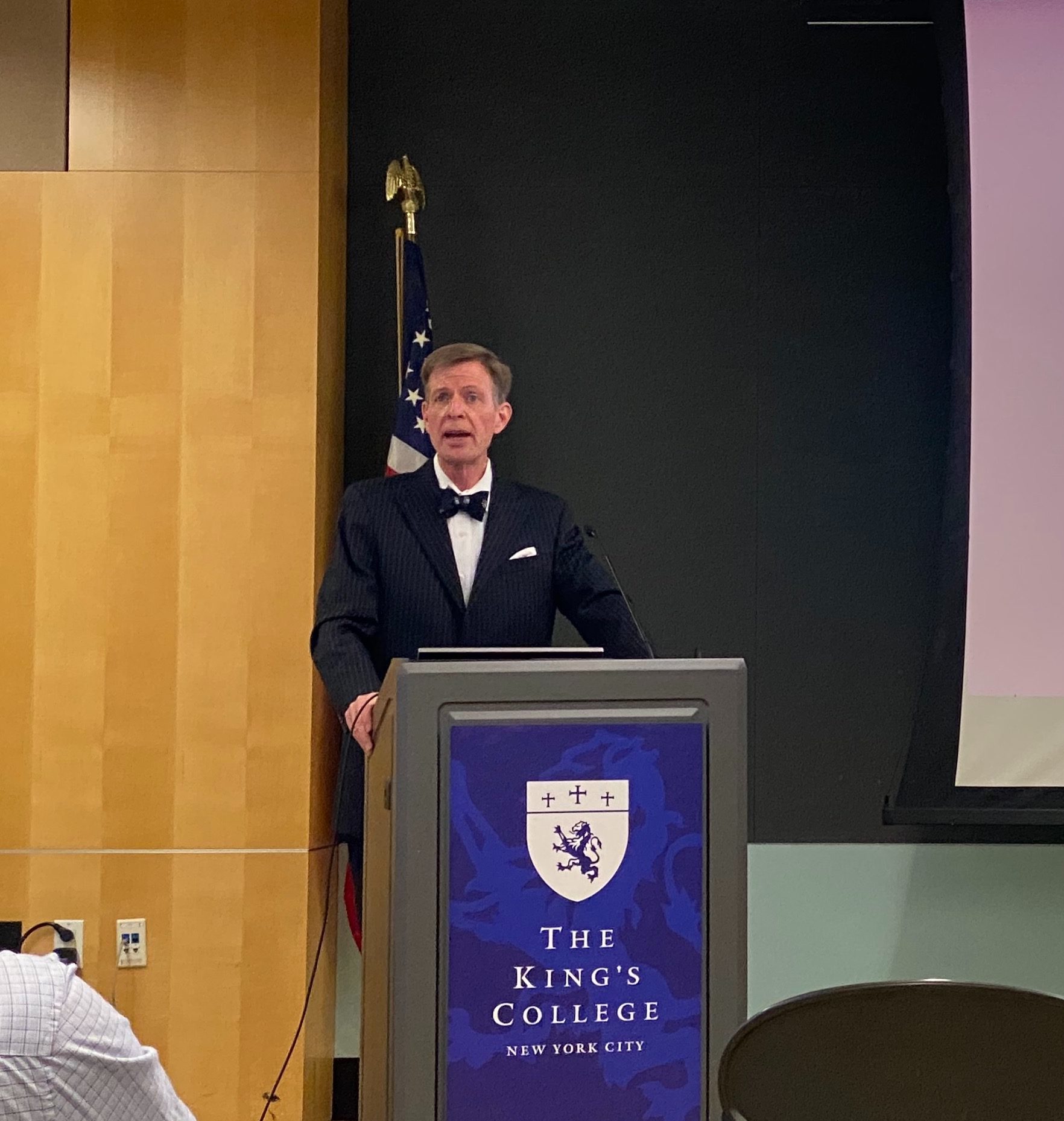Why This Supreme Court Matters More Than Ever: Senior Fellow Tim Goeglein Delivers Presidential Lecture
Former White House aid Tim Goeglein explained the significance of this year's Supreme Court case rulings.

On Thursday, March 10, Senior Fellow Tim Goeglein visited The King’s College to lecture on why this year’s Supreme Court term matters more than ever. Formerly a top aide to President George W. Bush and now the Vice President of External and Government Relations at Focus on the Family, Goeglein has been promoting Christian values in the public sphere for nearly 30 years.
The goal of the lecture was to discuss the key Supreme Court cases during this term and to understand the impact that the rulings could have on the American people. Goeglein commented, “I believe that there is not a more consequential term in the Supreme Court, for religious liberty, rights of conscience, or human life than this term.”
Goeglein then introduced the nine Supreme Court justices and explained their ideological composition. While many people talk about the conservative majority on the Supreme Court, Goeglein emphasized that since several of the Supreme Court justices are relatively new, we don’t exactly know how they will rule on Constitutional matters.
Goeglein also explained the highly selective process by which the Supreme Court chooses which cases to rule on. Out of the four to five thousand court cases that are presented to them each term, the Supreme Court only takes about 40 cases.
After concluding his initial remarks, Goeglein then transitioned to a discussion of the four key Supreme Court cases worth watching this term, and why they matter so much to religious liberty, rights of conscience, and human life.
Carson v. Makin
In the state of Maine, parents can use public tax dollars to apply to their child’s tuition at any school of their choice. There is a Maine Department of Education policy, though, that states that these tax dollars may not be sent to faith-based schools. In this case, parents in Maine are seeking to overturn this policy on the grounds that it violates the Constitution’s First Amendment right to freedom of religion, which would allow them to use public tax dollars at faith-based schools. Goeglein said that this is far beyond an issue of Maine schools and Maine tuition, but is rather a ruling on the right of religious liberty.
Shurtleff v. Boston
In the state of Massachusetts, the city of Boston has a tradition where they allow different groups to request to fly a flag for a day on one of the flagpoles in front of City Hall. When Camp Constitution, a Christian-based organization that works to support the Constitution applied to fly the traditional Christian flag in front of Boston’s City Hall, their request was denied on the basis of separation of church and state. The city of Boston said it would amount to a government endorsement of Christianity. In this case, Camp Constitution is seeking to overturn Boston’s ruling on the grounds that it violates the Constitution’s First Amendment right to freedom of speech.
Students for Fair Admissions v. President & Fellows of Harvard College
This case, and a similar one against the University of North Carolina at Chapel Hill, concerns the use of race in regard to college admissions. They address the underlying question of whether students can be admitted to elite private and public universities on merit and ability or whether other factors can apply as well, effectively determining whether race can be used for admissions. The group that brought the lawsuits, Students for Fair Admissions, has empirical evidence that shows that their clients were denied entry because race became a factor in choosing who was admitted to the schools.
Dobbs v. Jackson Women’s Health Organization
No case is more important in this year’s Supreme Court than the Dobbs case coming from the state of Mississippi. This court case deals with a law passed in Mississippi in 2018 called the “Gestational Age Act,” which prohibits abortion, with a few exceptions, after the unborn baby is 15 weeks old. Goeglein remarked that the Dobbs case is in the realm of Dred Scott, Marbury v. Madison, and Plessy v. Ferguson rulings, monumental court cases that could impact the country in significant ways. Goeglein said, “By any light, whether moral, legal, ethical, cultural, or political, this case is enormous.” Depending on how the Supreme Court rules, this case could either be used to overturn or weaken Roe v. Wade. Overturning Roe v. Wade wouldn’t end abortion in the United States but rather would return the question of the legality of abortion back to each state.
Through these four court cases, the Supreme Court holds tremendous power to shape the future of the United States. Goeglein believes that the ramifications of these Supreme Court rulings will change American life and have an enormous impact on the upcoming elections in midterm elections in November. “Nine human beings,” Goeglein said, “Otherwise known as nine unelected lawyers, are making decisions that will ultimately impact 350 million Americans.”
Max Pleban (PPE ’23) found the lecture helpful in understanding the impact of the Supreme Court. He said, “It’s so interesting to see how one case can be so consequential for the rest of our time in the country. Specifically, as we bring up this new Dobbs versus Jackson case, we can start to overturn precedents that have existed for decades, and which may or may not have been faulty.”
You can read more on Tim Goeglein’s previous Presidential Lectures about the topics of Christians engaging the public square and the quest for religious freedom.




